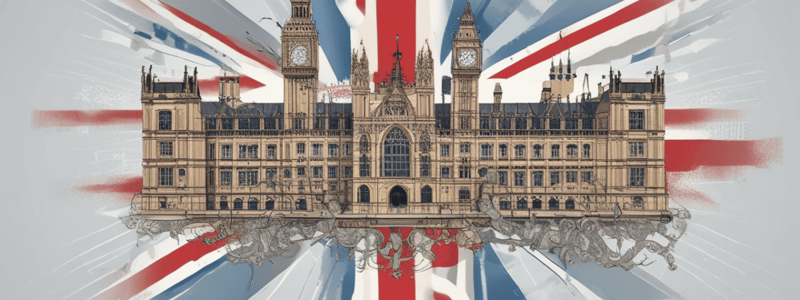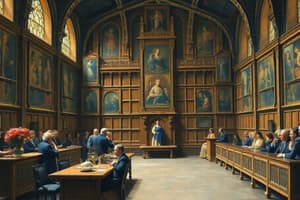Podcast
Questions and Answers
What kind of system exists in the United Kingdom's parliamentary system?
What kind of system exists in the United Kingdom's parliamentary system?
- Constitutional monarchy system
- Presidential system
- Majoritarian parliamentary system (correct)
- Proportional representation system
What is the main function of the party manifesto in the UK's parliamentary system?
What is the main function of the party manifesto in the UK's parliamentary system?
- To outline the party's policy goals (correct)
- To appoint cabinet members
- To elect the Prime Minister
- To dissolve parliament
What type of party system existed in the UK from the end of World War II to 1970?
What type of party system existed in the UK from the end of World War II to 1970?
- Two-party system (correct)
- Multiparty system
- One-party system
- Three-party system
What is the current classification of the UK's party system?
What is the current classification of the UK's party system?
What happens to the party that wins the majority of the votes in a UK election?
What happens to the party that wins the majority of the votes in a UK election?
What is unique about the UK's party system regionally?
What is unique about the UK's party system regionally?
What percentage of the popular vote did the two large parties (Conservative and Labour) garner together from the end of World War II to 1970?
What percentage of the popular vote did the two large parties (Conservative and Labour) garner together from the end of World War II to 1970?
What percentage of the vote did the two leading parties win together in the 2005 elections?
What percentage of the vote did the two leading parties win together in the 2005 elections?
What is the maximum term a Member of Parliament (MP) can serve in the House of Commons?
What is the maximum term a Member of Parliament (MP) can serve in the House of Commons?
Which political body has more power in the United Kingdom: the House of Commons or the House of Lords?
Which political body has more power in the United Kingdom: the House of Commons or the House of Lords?
How are members of the House of Commons elected?
How are members of the House of Commons elected?
Who presides over the House of Commons?
Who presides over the House of Commons?
How are MPs in the UK different from their counterparts in the United States?
How are MPs in the UK different from their counterparts in the United States?
What is the role of a 'whip' in the British political system?
What is the role of a 'whip' in the British political system?
How is the Prime Minister chosen in the UK?
How is the Prime Minister chosen in the UK?
Which of the following is NOT a feature of the British parliamentary system?
Which of the following is NOT a feature of the British parliamentary system?
What is the role of the Prime Minister in the event of a legislative vote of no confidence?
What is the role of the Prime Minister in the event of a legislative vote of no confidence?
Which body has the authority to perform a vote of no confidence against the Prime Minister?
Which body has the authority to perform a vote of no confidence against the Prime Minister?
What can happen if a government is rejected by a vote of no confidence?
What can happen if a government is rejected by a vote of no confidence?
What action did Tony Blair take to support the use of force against Iraq in 2003?
What action did Tony Blair take to support the use of force against Iraq in 2003?
How many times in the past seventy years has a government in the UK been toppled by a legislative vote of no confidence?
How many times in the past seventy years has a government in the UK been toppled by a legislative vote of no confidence?
Who has the ultimate electoral authority in the United Kingdom's political structure?
Who has the ultimate electoral authority in the United Kingdom's political structure?
Which of the following bodies does not directly elect the Prime Minister?
Which of the following bodies does not directly elect the Prime Minister?
What is a significant power of the Prime Minister regarding military actions?
What is a significant power of the Prime Minister regarding military actions?
What is one key responsibility of Members of Parliament (MPs)?
What is one key responsibility of Members of Parliament (MPs)?
How do MPs primarily vote in Parliament?
How do MPs primarily vote in Parliament?
What power does Parliament hold regarding the prime minister?
What power does Parliament hold regarding the prime minister?
What is the current status of the House of Lords in the UK's political structure?
What is the current status of the House of Lords in the UK's political structure?
Who primarily initiates legislation in the UK?
Who primarily initiates legislation in the UK?
What best characterizes the voting behavior of MPs in the House of Commons?
What best characterizes the voting behavior of MPs in the House of Commons?
What significant change occurred to the House of Lords over the last century?
What significant change occurred to the House of Lords over the last century?
How are individual legislative measures proposed in the UK Parliament?
How are individual legislative measures proposed in the UK Parliament?
What system did the Jenkins Commission recommend for a more proportional electoral system?
What system did the Jenkins Commission recommend for a more proportional electoral system?
Which of the following countries uses a mixed electoral system as recommended by the Jenkins Commission?
Which of the following countries uses a mixed electoral system as recommended by the Jenkins Commission?
How did the Labour government elected in 1997 approach the Jenkins Commission's recommendations?
How did the Labour government elected in 1997 approach the Jenkins Commission's recommendations?
What system does Northern Ireland use for elections?
What system does Northern Ireland use for elections?
What has traditionally characterized the political structure of the United Kingdom?
What has traditionally characterized the political structure of the United Kingdom?
What has the Labour government taken steps to restore since 1997?
What has the Labour government taken steps to restore since 1997?
Which party has historically benefited from the First Past the Post electoral system?
Which party has historically benefited from the First Past the Post electoral system?
What was one effect of the Conservative governments under Margaret Thatcher on local governments?
What was one effect of the Conservative governments under Margaret Thatcher on local governments?
Flashcards are hidden until you start studying
Study Notes
Structure of the Government
- The UK has a prime minister, House of Lords, and House of Commons, with the monarch having symbolic power.
- The prime minister is subject to a legislative vote of no confidence, which can lead to the resignation of the cabinet or new elections.
The Party System
- The UK has a majoritarian parliamentary system, where the majority party controls government and implements its policy goals.
- From 1945 to 1970, the UK had a two-party system, with the Conservative Party and Labour Party holding over 90% of the popular vote.
- After 1974, a multiparty system emerged, with the Liberal Democratic Party and nationalist parties in Scotland, Wales, and Northern Ireland gaining support.
- The current system is often called a two-and-a-half-party system, with the Liberal Democratic Party trailing behind the Conservative and Labour parties.
Political Conflict and Competition
- The party system varies regionally, with national parties competing in England and regional parties competing in Scotland, Wales, and Northern Ireland.
- In the 2005 elections, the two leading parties won about 67% of the vote, while other parties divided the remaining votes.
- The House of Commons has 646 members of Parliament, representing individual districts in the UK, elected for a maximum term of five years.
House of Commons
- The House of Commons has real power, while the House of Lords has limited power.
- Members of the government and opposition parties face each other in the chamber, with backbenchers sitting behind their leaders.
- Individual legislators have limited power, with low salaries, small staffs, and few resources.
- Parties designate whips to enforce party cohesion, and individual members rarely undertake individual initiatives.
Local Government
- The UK has traditionally been a unitary state, with no formal powers reserved for regional or local government.
- The Labour government elected in 1997 took steps to restore political power to regional and local governments.
- Local governments have a long tradition of powerful local government, despite limitations.
MPs' Roles
- MPs debate issues, participate in legislative committees, vote on legislation, and have the power to remove the prime minister through a vote of no confidence.
- Although the government initiates most legislation, individual members propose measures from time to time.
- MPs mostly deliberate, ratify, and scrutinize policies proposed by the executive, with the government usually imposing its will on the majority in the House of Commons.
Studying That Suits You
Use AI to generate personalized quizzes and flashcards to suit your learning preferences.




